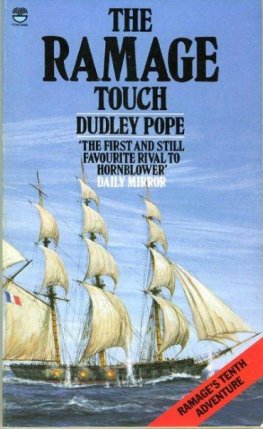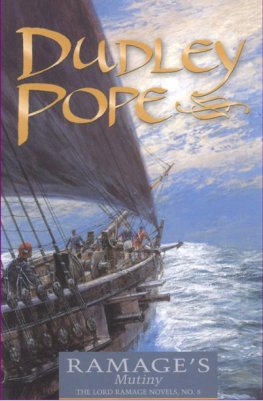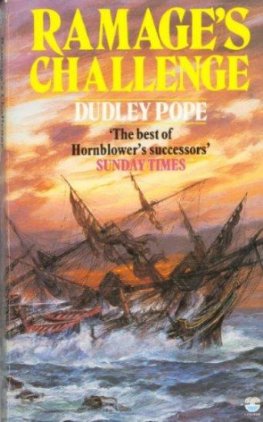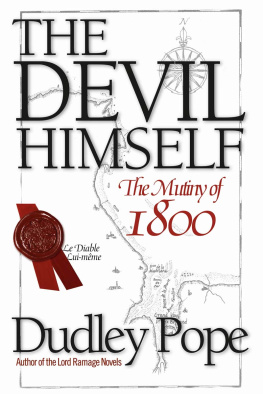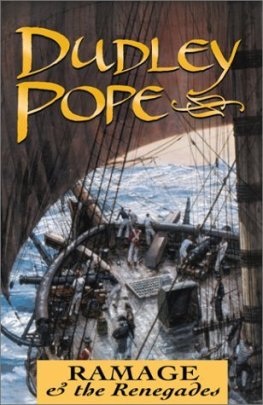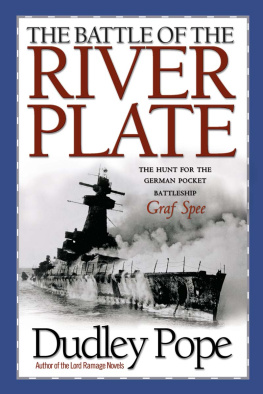Dudley Pope - Ramage and the Dido
Here you can read online Dudley Pope - Ramage and the Dido full text of the book (entire story) in english for free. Download pdf and epub, get meaning, cover and reviews about this ebook. genre: Adventure. Description of the work, (preface) as well as reviews are available. Best literature library LitArk.com created for fans of good reading and offers a wide selection of genres:
Romance novel
Science fiction
Adventure
Detective
Science
History
Home and family
Prose
Art
Politics
Computer
Non-fiction
Religion
Business
Children
Humor
Choose a favorite category and find really read worthwhile books. Enjoy immersion in the world of imagination, feel the emotions of the characters or learn something new for yourself, make an fascinating discovery.

- Book:Ramage and the Dido
- Author:
- Genre:
- Rating:4 / 5
- Favourites:Add to favourites
- Your mark:
- 80
- 1
- 2
- 3
- 4
- 5
Ramage and the Dido: summary, description and annotation
We offer to read an annotation, description, summary or preface (depends on what the author of the book "Ramage and the Dido" wrote himself). If you haven't found the necessary information about the book — write in the comments, we will try to find it.
Ramage and the Dido — read online for free the complete book (whole text) full work
Below is the text of the book, divided by pages. System saving the place of the last page read, allows you to conveniently read the book "Ramage and the Dido" online for free, without having to search again every time where you left off. Put a bookmark, and you can go to the page where you finished reading at any time.
Font size:
Interval:
Bookmark:
DUDLEY POPE
Ramage and the Dido
To Jane Clare Victoria
With much love
AUTHOR'S NOTE
I have taken a liberty with one historical fact. A French frigate carrying the first mango plants from Mauritius to Martinique was captured by the British frigate Flora, Captain Marshall, one of Rodney's squadron, in 1782 and taken to Jamaica.
Dudley Pope
French West Indies
CHAPTER ONE
Ramage folded the Morning Post and sat back comfortably. There was very little news in the paper and he passed it to Sarah, who was an avid newspaper reader and had already finished The Times and sniffed at the lack of anything of interest.
He had another five days' leave: time enough to go down to Aldington and have a look at the Kent countryside, apart from reassuring himself that all was well with the house, although Sarah had been staying there most of the time he was away in the Mediterranean, only coming up to London in a hurry when she heard that he had arrived back in Portsmouth.
His parents' home in Palace Street was a serviceable halfway house for both of them, apart from being conveniently near the Admiralty and even nearer the House of Lords, so that his father, the Earl of Blazey, could attend debates whenever he wished.
Ramage was vaguely aware of a horse pulling up outside the front door, although the sound of passing horses clopping their way along Palace Street was nothing out of the ordinary, but a few minutes later the old butler, Hanson, appeared at the door, his spectacles sliding down his nose as usual.
'An Admiralty messenger, my lord: he has a letter for you and needs you to sign a receipt.'
Ramage nodded and went to the front door, signing the proffered receipt book and taking the letter. It felt strange, heavy and stiff, as though the paper with its heavy seal enclosed a sheet of parchment. He shrugged his shoulders as he walked back to the breakfast room to rejoin Sarah, who looked up inquiringly.
'Probably fresh orders,' he said and, noting the alarmed look on Sarah's face, added: 'I doubt if they're urgent: their Lordships know I haven't had much leave in the past few years.'
Sarah walked over to the desk and came back with a paperknife. 'Break the seal and put a stop to the suspense,' she said. 'I couldn't bear it if you have to go away again so soon.'
Ramage was reluctant to hurry: the sheer weight of the packet did not bode well. Routine letters were not written in parchment, and this packet crackled when he squeezed it. He took the paperknife and pried open the outer seal, and the folded paper opened by itself to reveal a parchment commission inside. He recognized it immediately - but a commission? What was happening to the Calypso frigate, which he had commanded for the past few years? She was even now waiting for him down at Portsmouth, under the temporary command of her first lieutenant, James Aitken.
But there was no mistaking the document: there was the Admiralty Office seal at the top left-hand corner, red wax with white paper on top; the blue stamp duty seal below it, with '11 shillings and 10 pence' and a crown; and three signatures beneath the verbiage in the middle. Yes, it was a commission right enough, but sending him where, and in what ship?
He began reading, starting with the first few lines at the top. 'By the Commission for Executing the Office of Lord High Admiral of the United Kingdom of Great Britain and Ireland, &c.'
Then came the main section of the commission: 'By virtue of the Power and Authority to us given, We do hereby appoint you Captain of his Majesty's ship the Dido, willing and requiring you forthwith to go on board and take upon you the charge and command of Captain in her accordingly: strictly Charging and Commanding all the Officers and Company of the said ship to behave themselves jointly and severally in their respective employments. . . Hereof nor you nor any of you may fail as you will answer to the Contrary at your Peril...'
It ended with 'By command of their Lordships' and the signature of Evan Nepean, the Secretary to the Board, on the left, and the signatures of three Board members on the right.
The Dido?But wasn't she a seventy-four? He had a fleeting picture in his mind of seeing her in Gibraltar some time ago. Command of a seventy-four!
'Why are you grinning?' Sarah asked quietly, obviously fearing the worst.
'I think I've just been given command of a seventy-four,' he said. 'Let me find a copy of Steel's List and check the name.'
His father's copy of Steel's Original and Correct List of the Royal Navy was on the desk, a thin grey-covered volume. He flipped through the pages until he came to the one headed 'A complete List of the Royal Navy,' where all the ships, from the 112-gun Salvadordel Mundo to hired armed cutters and luggers, were named alphabetically. Yes, there was the Dido, at present in Portsmouth and built in 1798. She had been paid off, and obviously he would have to commission her.
He felt a sudden nostalgia for the Calypso. And what was going to happen to all the officers and men with whom he had sailed for so long? He would be lost without the old master, Southwick, who had served with him since he had been given his first command as a callow lieutenant in the Mediterranean so many years ago. And the Scot, Aitken, who had once refused a command to continue serving with him. And 'Blower' Martin, the junior lieutenant with his flute. And seamen like Jackson, Stafford and Rossi. Thinking of them took the shine off the new appointment.
'This is a big promotion,' Sarah said. 'Your father will be pleased. Getting command of a second rate at your age . . .'
'Third rate,' Ramage corrected. 'It'll be a few more years before I get the chance of a second rate.'
Sarah shrugged her shoulders. 'I never did understand "rates",' she admitted.
'It's just a matter of the number of guns a ship carries. A first rate has a hundred guns or more, a second rate between ninety-eight and ninety, a third rate from eighty to sixty-four . . . The Calypso is a fifth rate with thirty-two guns, and last of all comes a sixth rate, between thirty and twenty guns.'
Again Sarah looked puzzled. 'I know this is a dreadful thing for the wife of a post-captain to admit, but the number of guns does not mean very much. How big is the ship? How many men does she carry?'
'Well, seventy-fours vary slightly - the later ones are larger - but the Dido is probably about 170 feet long on the gun-deck, has a ship's company of about 600, and is around 1,700 tons - more when she is provisioned for six months, of course. Now can you picture her better?'
'Not really. Will I be allowed on board to visit you?'
'Of course. You'll have to come down to Portsmouth - but there'll be plenty of time: I've got to commission the ship.'
At that moment Ramage's father came into the room and wished them both a cheerful good morning. Almost immediately he saw the commission lying on the table, along with a copy of Steel's List, and recognizing both he looked questioningly at his son. 'You've heard from the Admiralty?'
'Yes, their Lordships have given me a new ship.'
'Oh. You'll be sorry to leave the Calypso - she's become a second home!'
'Yes - but they've given me a seventy-four.'
'Ha, at last their Lordships have woken up to your worth! It was probably that last cruise in the Mediterranean that did it. After all, they gave you a whole Gazette to yourself for winkling out those Saracens. What ship?'
'The Dido. I have to commission her at Portsmouth.'
'Dido? She's only seven or eight years old - I remember her being launched at Bursledon. Well, having to commission her is as good a way as any of getting to know your way round a two-decker. You'll be at the mercy of your first lieutenant and master - d'you know who they'll be?'
Font size:
Interval:
Bookmark:
Similar books «Ramage and the Dido»
Look at similar books to Ramage and the Dido. We have selected literature similar in name and meaning in the hope of providing readers with more options to find new, interesting, not yet read works.
Discussion, reviews of the book Ramage and the Dido and just readers' own opinions. Leave your comments, write what you think about the work, its meaning or the main characters. Specify what exactly you liked and what you didn't like, and why you think so.

